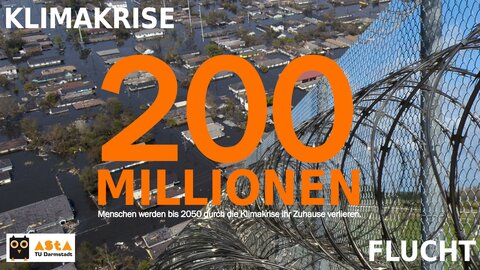Sandro Thalmann Dec 14 2023 - 3:27pm
By 2050, it is estimated that over 200 million people will lose their homes due to the climate crisis and will have to flee. At the same time, environmental and climate disasters are not internationally recognized grounds for asylum and there is a lack of support or compensation for climate refugees. On the contrary, the European right to asylum is being restricted and escape routes are being made more difficult. - Installation and lecture on the links between the climate crisis and flight.
Installation: grids to vessels
🗓️ 15 January - 01 March | 📍 Foyer ULB | 🕓 Open all day
Accompanied by facts about the presence of the climate crisis, we are exhibiting three works by Noa Torres that deal with flight and (in)freedom of movement. In they artistic position, Noa Torres makes the theme of the event physically and visually tangible. They has focussed in particular on the concept of climate justice, historically evolved power structures and personal responsibility. The concept of "grids to vessels" is about describing the transformation from marginalising grids, grids, barriers and patterns to the comprehensive concept of the vessel. The vessel is seen as a place of collection, storage or as a container of care and collective solidarity.
This idea aims to change the way social values are assigned and intends to reshape a community narrative.
We are also pleased to have a contribution from Seebrücke Darmstadt.
The exhibition will open on 15 January and can be viewed in the foyer of the University and State Library until 1 March. The exhibition opening will be accompanied by a lecture by Eugenia Winter on 15 January at 6 pm in S1|03 223 entitled Climate - Flight - Border Regime.
Lecture: Climate - Flight - Border Regime. Migration and colonial continuities of the climate crisis
🗓️ 15. January | 📍 S103|223 | 🕓 18:00 Uhr
Lecture by human geographer Eugenia Winter (Goethe University Frankfurt):
We live in a time in which social injustice, climate change and colonial continuities such as the criminalisation of migration are increasingly being downplayed again. How and by whom are these issues being addressed at our universities? Universities are still places that exist in a global knowledge economy with a clear hegemonic centre that reflects hierarchies of race, class and gender. How are universities discussing the fact that border and migration regimes were mechanisms to enforce racialised access and to force the production of profits from colonial exploitation?
Today's migration regimes are functionally related to the ideologies, norms and institutions of economic and political interdependence that underpinned colonialism. In this context, the notion of environmental racism is closely linked to those who benefit from so-called 'prosperity' - the elite of (former) colonial countries - and those who are victims of the targeted dispossession for it - the populations who experience a continuum of territorial dispossession, from the exploitation of natural resources since colonisation to the current '(sustainable) development projects'. Many people living in these areas are systematically displaced, whether by the resulting conflicts, pollution or extreme weather events caused by climate change.
Free admission, no registration required
